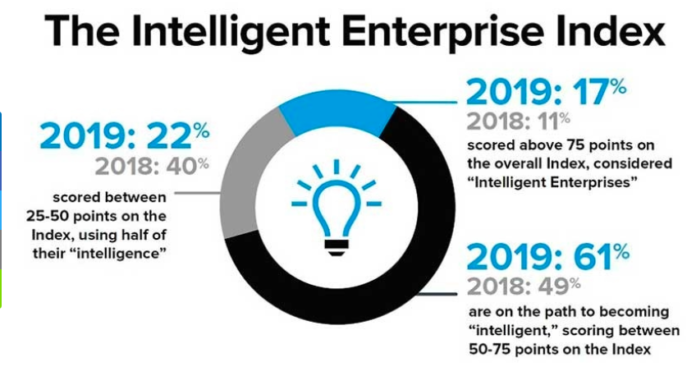A record 61% of enterprises worldwide are on the path to becoming “intelligent,” compared to only 49% in 2018, according to the latest annual Intelligent Enterprise Index from Zebra Technologies.
The index is based on an online survey was fielded from Aug. 12 to Sept. 18 across healthcare, manufacturing, retail and transportation and logistics industries.
In total, 950 IT decision makers from nine countries were interviewed, including the United States, United Kingdom, France, Germany, Mexico, Brazil, China, India, and Japan.
Results show that retail organisations have gained the most momentum in the last 12 months, graduating from the bottom of the 2018 vertical Index rankings to nearly the top of the 2019 list, second only to Healthcare.
The number of companies defined as truly “intelligent enterprises” by achieving a score of 75 points or greater on the Index has also risen year over year.
“We now see more urgency to improve operational visibility and facilitate the delivery of actionable intelligence all the way to the edge of the enterprise,” said Drew Ehlers, global futurist at Zebra Technologies.
“I believe that is why enterprises are now demonstrating a much greater commitment to executing their IoT plans and why we’ll likely see a surge in investments over the next few years,” said Ehlers.
Findings also show that the pace of IoT adoption is picking up, leading to increasingly greater intelligence levels. The cumulative Intelligent Enterprise Index score continues to grow as more companies move from exploratory to deployment phases of their journeys, with the 2019 score topping out at 61.5 points.
In 2019, the average global enterprise spend was $6.4 million, representing a 39% year-over-year increase. Up to 92% of APAC organisations expect their investments in IOT and mobility to increase over the next 1-2 years.
Almost half (46%) of respondents are currently implementing their IoT solutions on a company-wide level, an increase from 38% in 2018. Another 32% expect to soon move toward regional deployments.
















